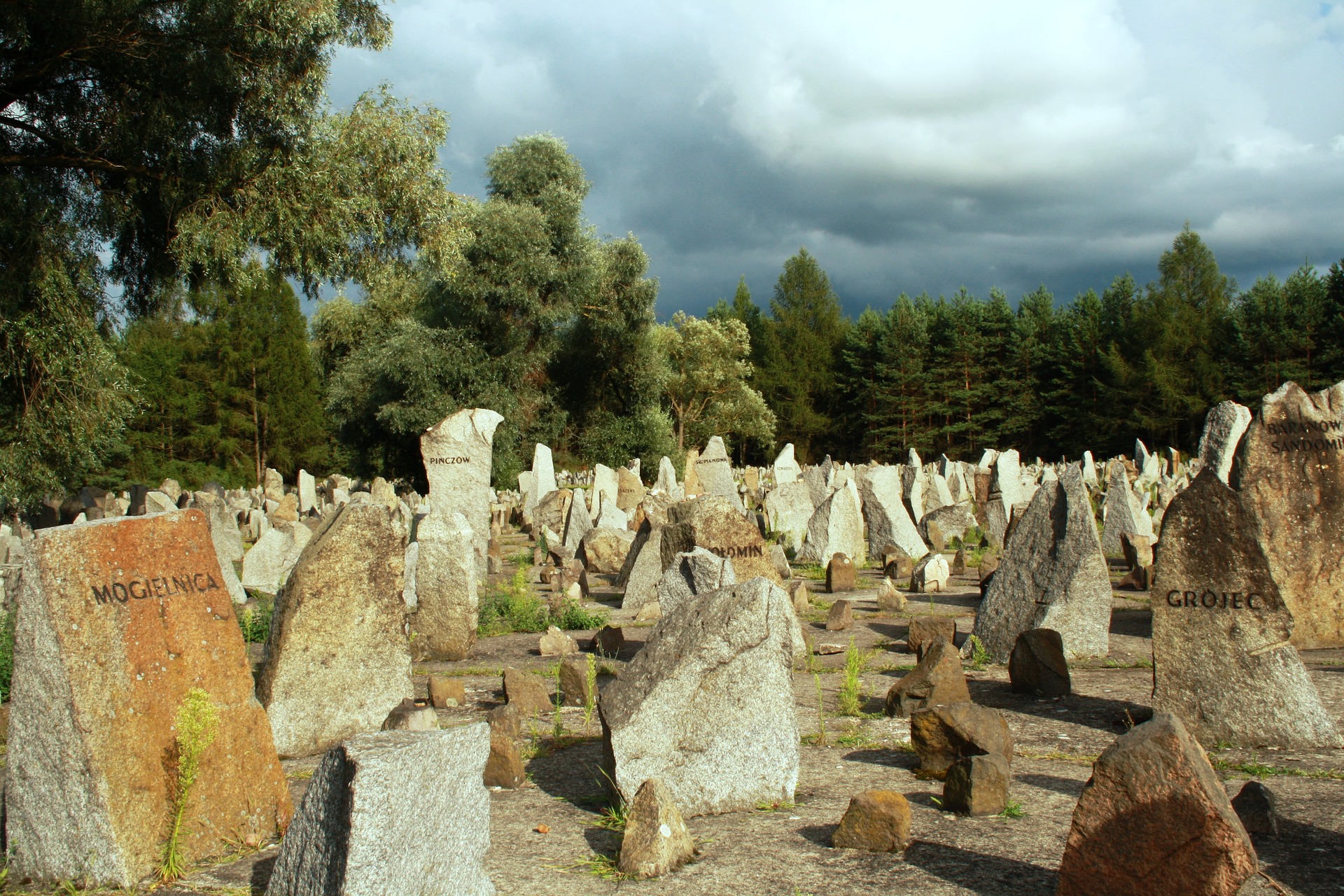
Memorials versus Modern Jewish Life in Poland
At Treblinka, I wondered at the labor it must have taken to construct such an obscene place, and the labor of bringing our little group out here to see it. How many people must pass through every day for the bouquets to remain fresh, to account for every clean flag of Israel, poking out of the ground, jammed between the rocks, draped deliberately over trees.
Our group didn’t visit these sites as tourists, or with the intention of villainizing Poland. We came only as witnesses to the memorial sites and camps, and to the growing Jewish community in Warsaw and Krakow. We visited local JCCs, none more than nine years old, where young Polish Jews fight to have their heritage recognized by their peers and government. Most Jews in Poland do not find out that they’re Jewish until well into adulthood, when parents or grandparents finally feel safe enough to reveal the truth. Our guide at the Warsaw JCC told us that deathbed confessions are not uncommon.
JCC Krakow, the older of the two, hangs brightly colored posters around the city with caricature dreidels and challah bread. “Did your Grandfather ever play with this?” is printed next to the dreidel, and “Did your Grandmother ever bake this for you?” beside the challah. “Come see us!” they say at the bottom, indicating the JCC’s center-city address. Other posters show Hebrew letters and other paraphernalia, anything that might provoke some déjà vu and begin the process of questioning. Those who chose to embrace their ancestry have created a small and shockingly pure bubble of Jewish culture in modern-day Poland; a spectacular thing to witness after my work with testimony.
On the last day of our trip, we were asked to list the challenges facing the Jewish communities in Poland today, and to propose solutions. The question was frustrating and personal. Our little group debated for over an hour. Whose job is it to preserve these places and memories when there are no more survivors left to advocate their legitimacy? Holocaust memorials like Treblinka are necessary pilgrimage routes, where young adults are encouraged to come and test their resolve to create a better world, no matter their heritage.
The stones at Treblinka evoked in me some deep-seated terror, a creeping discomfort I felt when I tried to engage. We’d been specifically chosen to come here, handpicked from a pool of impressive applicants from all over the world, but our emotional response as a group was muted, directionless. I placed my hand over a tiny stone to my right and felt awkward.
Of those who survived Treblinka and the other death camps in Poland, there are only a handful still alive and able to testify to their experiences. In my work at the Holocaust Education Center, I noticed that survivors admitted regularly that they would tell their story only once, for the tape, and never speak of it again. Some asked us to release the tape only after their death.
Our guide for Treblinka crossed the field ahead of us. Around the monument and behind it, some stones bear the names of towns, Jewish towns in Poland that no longer exist. She crouched at the base of one in particular, too far away for me to see the name, and lit a candle. We left an hour later, well after dark.
Chloe Rose Stuart-Ulin is a Canadian/American writer based in Montreal, Canada. Her nonfiction work has appeared internationally for Ha’aretz (Israel) and Macleans (Canada), Lilith and The American Pilgrims Association (U.S.). She is a graduate of the BFA Creative Writing program at the University of British Columbia.
The views and opinions expressed in this article are the author’s own and do not necessarily reflect those of Lilith Magazine.
2 comments on “Memorials versus Modern Jewish Life in Poland”
Comments are closed.




Chloe, I’ve noticed that very few stories on this Lilith site elicit comments. This disappoints me. Nonetheless, I appreciated reading your story. Keep up the good work. Our individual and collective histories need to be shared.
There are many people that don’t believe Treblinka was a “death camp”. Transit camp yes but not a death camp. This book link I thought covered all the major points and I think it would be beneficial to getting to the whole truth about the camp. You can download the book below for free if you so desire. If you do read it with an open mind like I have this book version of what the camp was makes much more sense. Aren’t we all wanting to get to the TRUTH of the matter?
You complain that no one posted to this article yet I have and how will it be received?
Regards
Jim Rizoli
http://holocausthandbooks.com/index.php?page_id=8